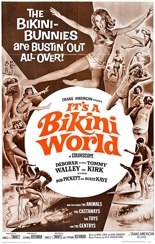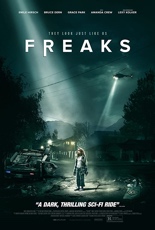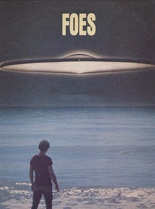
 Although a copycat of AIP’s Beach Party series that AIP eventually scooped up for distribution, It’s a Bikini World stands out for another reason: being the only movie of its kind to be directed by a woman — for the record, Roger Corman protege Stephanie Rothman (Terminal Island). She also co-wrote the screenplay with the producer, Charles S. Swartz, who happened to be her husband.
Although a copycat of AIP’s Beach Party series that AIP eventually scooped up for distribution, It’s a Bikini World stands out for another reason: being the only movie of its kind to be directed by a woman — for the record, Roger Corman protege Stephanie Rothman (Terminal Island). She also co-wrote the screenplay with the producer, Charles S. Swartz, who happened to be her husband.
Pinch-hitting in the Frankie and Annette roles are teen-pic staples Tommy Kirk and Deborah Walley, reteamed from the previous year’s The Ghost in the Invisible Bikini. On the beach, Mike (Kirk) is instantly attracted to the new-in-town Delilah (Walley), but she’s just as quickly put off by his braggadocio vibe of entitled swordsman. Overhearing Delilah tell pal Pebbles (Suzie Kaye, Women of the Prehistoric Planet) she prefers men to have brains, Mike dons a disguise of glasses and bowtie to pass himself off as his nonexistent nerdy brother, Herbert.
 By gum, it works! Delilah starts falling for Herbert while challenging Mike to races in hopes of chipping away at his massive alpha-male ego. Meanwhile, Herbert — er, I mean, Mike — is faced with the dilemma fueling so many sitcom reruns in perpetual syndication: how to show up to one place as two people! It culminates in a 12-event, battle-of-the-sexes competition that finds Delilah and Mike racing one another using various vehicles (skateboards, boats, camels) and driving a motorcycle through an automated car wash. Each event is introduced with smilin’ Sid Haig (Spider Baby) twirling semaphore flags.
By gum, it works! Delilah starts falling for Herbert while challenging Mike to races in hopes of chipping away at his massive alpha-male ego. Meanwhile, Herbert — er, I mean, Mike — is faced with the dilemma fueling so many sitcom reruns in perpetual syndication: how to show up to one place as two people! It culminates in a 12-event, battle-of-the-sexes competition that finds Delilah and Mike racing one another using various vehicles (skateboards, boats, camels) and driving a motorcycle through an automated car wash. Each event is introduced with smilin’ Sid Haig (Spider Baby) twirling semaphore flags.
While Bikini World is built upon the subgenre’s tried-and-true teen themes, it also doesn’t quite have the off-the-shelf interchangeability of other beachsploitation efforts. The first giveaway comes in the first scene, as a trio of sunglasses in close-up relays frames (no pun intended) composed with true forethought. Oh, the flick is still frothy, but Rothman has infused it with an artfulness — pop and otherwise — and a feminist attitude among all the pulchitrude. If only she didn’t have to ditch the uniqueness in the film’s final seconds!
Possibly because the film came out in the trough of the beach-movie cycle, it boasts arguably the least square music performances from today’s vantage point — in particular The Animals’ “We Gotta Get Out of This Place” and The Castaways’ “Liar Liar.” Not even the sight of Bobby “Boris” Pickett (as in “Monster Mash”) dancing to tunes while wearing a comically oversized hat can kill the good taste. —Rod Lott










